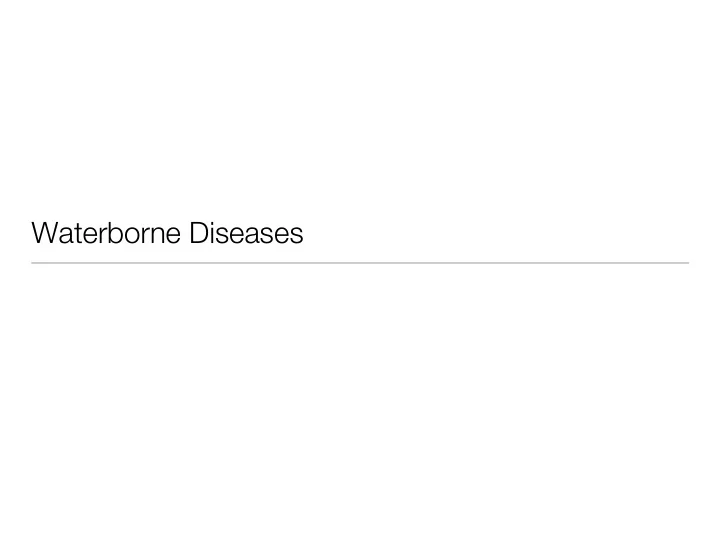

Waterborne Diseases
Introduction Video: “Water Facts” by GE Water & Process Technologies Watch Here: http://www.youtube.com/watch?v=laJYq_Mfk7Q
Talk about Feces 5 ways talking poop a ff ects women
1) The majority of illnesses in the developing world are caused by fecal matter.
2) In many cultures around the world, women and girls have to wait until nightfall to use the bathroom.
3) Schools without safe, separate, and proper sanitation facilities prevent girls from attending school.
4) It’s not all bad! Many organizations have made strong e ff orts to fight for proper water supplies and sanitation around the world.
5) Global partnerships are already making a huge impact on sanitation e ff orts around the world.
Diarrhoea (Diarrhea) 1.5 millions deaths per year • 800,000 under 5 • Prevented by • clean water • education • hand-washing • vaccine • Treated with • rehydration • continued feeding •
Dysentery 700,000 deaths annually • Prevented by • hand-washing • clean water • education • Treated with • rehydration • antibiotics •
Cholera 100,000-130,000 deaths • annually Prevented by • water purification • education • vaccination • Treated with • rehydration • antibiotics •
Typhoid Fever A ff ects 20 million annually • Prevented by • water sanitation • hygiene • Treated with • rehydration • antibiotics •
Dengue Fever A ff ects 200 million annually • Prevented by • no vaccination • mosquito nets (sleeping) • access to fresh, flowing water • Treated with • no anti-viral drugs • rehydration • blood transfusion (if necessary) •
Malaria A ff ects 207 million annually • Prevented by • mosquito control • education • medication • clean, flowing water • Treated with • anti-malarial medication •
Schistosomiasis • A ff ected 249 Million in 2012 • Prevention: • improved sanitation • hygiene education • snail control • Treatment: • medicine
Developed Countries (Global North) More access to education • Widespread sanitation systems • Western medicine • Well regulated water supply system • Developing Countries (Global South) � Less access to education � • Inconsistent sanitation systems � • • Insufficient water supplies
Your Turn group work
Question 1 True or False Diarrhea is responsible for 800,000 deaths of children under 5 years of age.
Question 2 True or False Malaria is the only WBD transmitted by mosquitoes.
Question 3 True or False Dysentery is passed by person-to-person contact.
Question 4 True or False Cholera has no vaccine.
Question 5 True or False WBD are most prevalent in South America.
Answers 1. True 2. False 3. True 4. False 5. False
Question 6 From what you learned today, and from what you already know from the media, which disease deserves the most attention? Why?
What Can You Do? Join UNA-GP • Conserve Water • Education Yourself • Volunteer • Spread the Word •
Final Video: “ADRA Animated Short: Water” by ADRAInternational http://www.youtube.com/watch?v=VCfy24dSkfM �
Recommend
More recommend